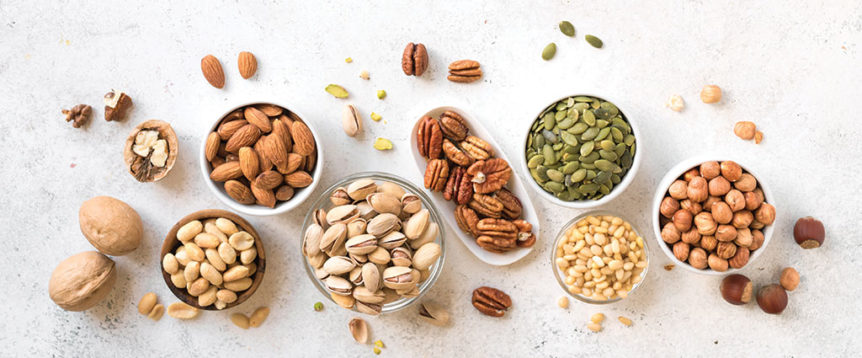It’s proven fact: All nuts are good for you. They provide healthy fats, fiber, protein and more. But, just as every superhero has unique special powers, each nut variety has its own set of super-skills—a nutrient mix that delivers unique benefits to those who eat it.
Here’s a rundown of what six common nut varieties bring to the table.
Peanuts
Peanuts have more protein than any nut (7 grams per serving), says Jada Linton, a spokesperson for the National Peanut Board. This makes peanuts an excellent high-protein option for people eating a plant-based diet. They also come out on top for their levels of folate, which is vital for DNA synthesis and fetal development, and niacin, a heart-healthy B vitamin that also supports your brain.
In 1 ounce of peanuts, you’ll get 7 grams of protein, 10 to 17 percent of your DV of folate (depending on how they were processed) and 17 to 19 percent DV of niacin. One serving also contains 10 percent of your daily fiber and 9 to 16 percent of your DV of copper. Plus, nearly 90 percent of the fat in peanuts is unsaturated, which is the happy-heart variety.
Pistachios
A recent study at Louisiana State University concluded that pistachios far outrank other nuts for levels of melatonin, an important plant compound that encourages a healthy sleep cycle. Pistachios also offer the most vitamin B6, which supports your heart, brain, eyes and mood. They are also highest in lutein and zeaxanthin, which are important nutrients for eye health.
Although there has been only one study done on pistachios’ melatonin content, it found 660 nanograms per gram, which is substantially higher than any other food source. They also contain 18 to 24 percent of your DV of B6 and 18 to 22 percent of your copper needs in each serving.
Walnuts
Walnuts are the only nut considered an excellent source of the essential omega-3 fat ALA, a nutrient that can benefit heart health, says Hillary Wright, MEd, R.D., director of nutrition at Domar Center for Mind/Body Health in Boston. Research on male fertility has also tied higher intakes of ALA from walnuts to less frequent sperm chromosome abnormalities, which can cause genetic conditions like Down syndrome, Wright adds.
One serving of walnuts (1 ounce or ¼ cup) contains 2.5 grams of ALA and nearly half your DV of manganese. Walnuts also supply 4 grams of protein, 22 percent of your copper DV and decent levels of melatonin, which is linked to sleep quality.
Cashews
Copper content is a standout in this nut’s nutritional profile, which means it benefits your blood cells and vessels, immune system, nerves and bones, and helps you absorb iron, which it also contains more of than any other nut. Cashews also contain the most vitamin K, making them a good bet for bone health, effective blood clotting and more. And they rival almonds for their levels of magnesium, which is essential for heart and bone health. In addition, a study published in Nutrients in 2018 found that cashews may have 16 percent fewer calories than most labels report.
You’ll get nearly a third of your daily copper needs in each 1-ounce serving of cashews. They also contain 12 percent DV of vitamin K, 18 to 20 percent DV of magnesium and 9 to 10 percent DV of iron.
Pecans
“Traditionally thought of as a dessert nut, pecans are actually a nutritious addition to healthy eating lifestyles,” contends the American Pecan Council. And they’ve got the numbers to back it up. Pecans are the tree nut highest in manganese, a nutrient essential for metabolism and bone health, and carb-watchers will be glad to hear that pecans are neck-and-neck with walnuts for the lowest number of carbohydrates—about 1 percent of your DV for carbs per serving. They also provide the most monounsaturated fats, which are the kind your heart likes best.
Each 1-ounce serving of pecans provides 63 percent of your DV for manganese, 11.4 grams of monounsaturated fats, 11 percent of your daily fiber needs and 12 percent of your daily intake needs for thiamine, a B vitamin that benefits your nervous system.
Almonds
“Ounce for ounce, almonds are the tree nut highest in vitamin E, calcium, and the B vitamins riboflavin and niacin, making them one of the healthiest snacks around,” says Jenny Heap, a registered dietitian nutritionist and spokesperson for the Almond Board of California. In fact, almonds are one of the top food sources of vitamin E, a nutrient that benefits your immune system, skin, eyes and more. They also contain more fiber than any other tree nut and are high in magnesium, which can regulate blood pressure and protect against type 2 diabetes and osteoporosis.
A 1-ounce handful of almonds provides nearly 40 percent of the vitamin E DV, 20 percent DV of magnesium, 17 percent DV of riboflavin and 7 percent DV of calcium. It also offers 6 grams of plant protein, 4 grams of hunger-fighting fiber and 9 grams of healthy monounsaturated fat.

